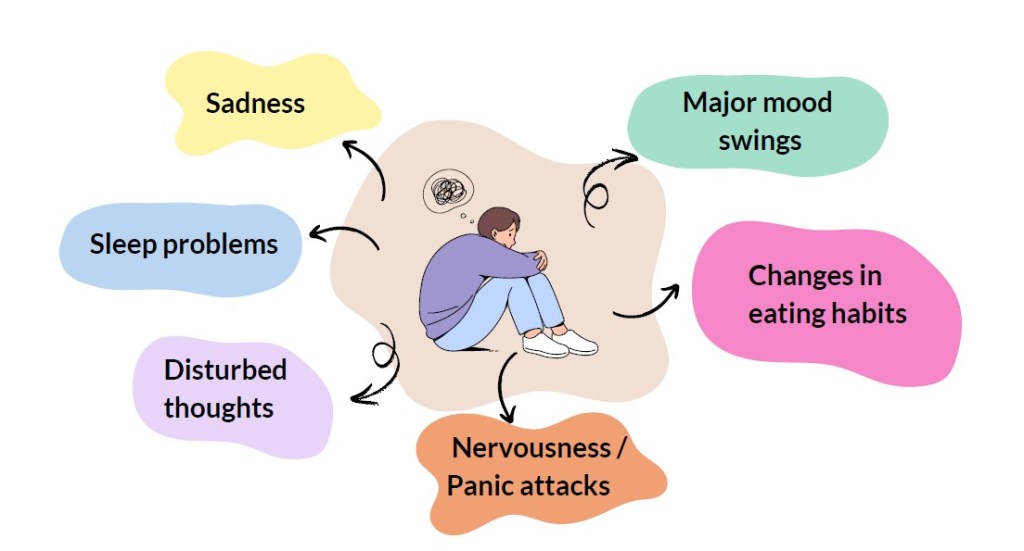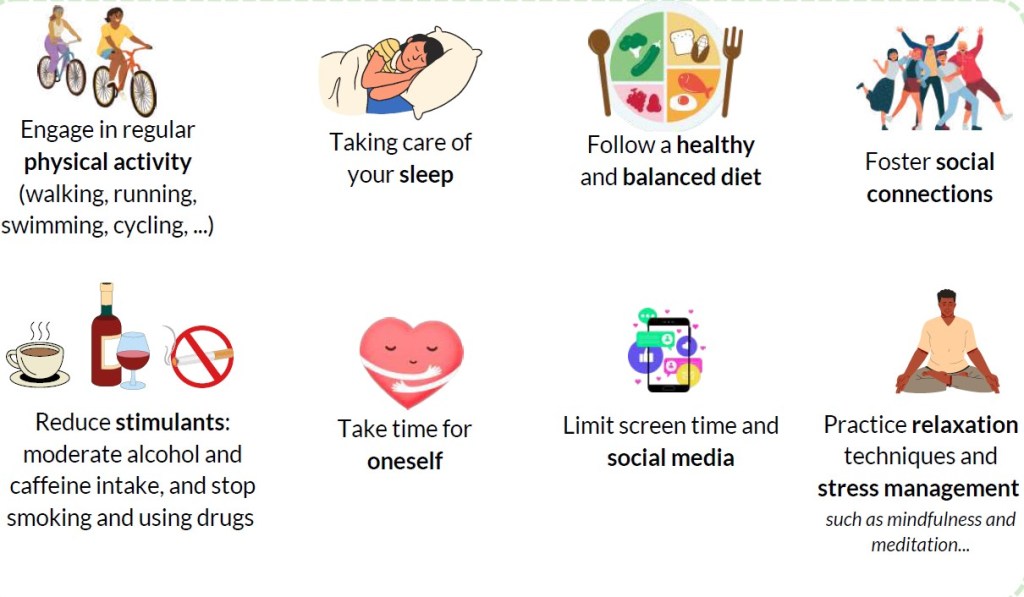Anxiety / depression: what you need to know
Source: Nutriactis/Rouen-Normandie hospital
Summary
- What is mental health?
- Anxiety & depression: A sign of weakness?
- Anxiety/Depression: A Matter of Willpower?
- Reducing the risk of anxiety/depression: Is it possible?
- Conclusion
In a constantly evolving world, anxiety and depression are realities that many people unfortunately face daily. These disorders can have multiple repercussions on health as well as on quality of life. In this article, we invite you to learn more about mental health and to uncover the reality behind some common misconceptions on this topic. On the last page of this article, we provide a printable memo with various practical exercises to help you better manage your anxiety on a daily basis.

What is mental health?
‘’Being healthy is not just about not having a disease or infirmity, but it’s about
experiencing physical, mental, and social well-being’’ (WHO: Worldhealth organization)
Mental health is thus an integral part of overall health and well-being.
Positive mental health
- State of well-being
- Sense of fulfillment
- Full use of one’s abilities
- Ability to cope with life’s challenges
Mental health disorders
- Disturbances in psychological state
- Emotional and behavioral difficulties
- Feelings of distress
Examples: Anxiety, depression, schizophrenia,
bipolar disorders…

Common misconceptions about anxiety and depression
1- Anxiety & depression: A sign of weakness?
Anyone can suffer from a mental or physical illness at some point in their
life, regardless of gender, age, life experiences, intelligence, or social class. Our mental health can vary throughout life and can be influenced by several
factors:

All these factors can contribute to disturbing mental health and increasing the risk of anxiety and depression.
Experiencing mental difficulties is neither a failure, a choice, nor a sign of
weakness.
It is generally complicated to self-diagnose mental disorders, which is why, in
case of difficulties, it is recommended to talk to your doctor, who is qualified
to make a diagnosis. Sharing your struggles, especially with a healthcare professional, is a sign of strength and the key to better well-being.
Furthermore, if you think someone in your circle may be experiencing mental health issues, don’t hesitate to discuss it with them, always with kindness.
In times of difficulty, being compassionate is essential; judging harshly is not the
solution. Kindness is the key to flourishing mental health!
2- Anxiety/Depression: A Matter of Willpower?

Everyone has experienced these feelings at some point…
However, these emotions are most often temporar and are normal throughout life. Nevertheless, sometimes these states persist and significantly disrupt daily life, which could indicate a mental health disorder.
Some signs may alert you to the need for psychological support and professional help:
- Emotional: Sadness, fear, stress, nervousness, discouragement, anger, feelings of failure, burnout, irritability…
- Behavioral: Changes in eating habits, decreased energy, fatigue, inability to carry out daily activities (reduced leisure), aggression, isolation, substance abuse…
- Cognitive (Mental): Difficulties in reasoning normally, disturbed/distorted thoughts, memory issues…
- Physical: Headaches, sleep disturbances, visual or auditory perception issues…

When one or more of these signs become chronic (last over time), it indicates a high risk of anxiety or depression. It’s important to note that this list is not exhaustive, and other symptoms may exist. If you have any doubts, we recommend seeking support from a healthcare professional.
Anxiety and depression are disorders associated with biological disruptions (serotonin,
dopamine, cortisol levels…). These imbalances explain the symptoms described above by
affecting motivation mechanisms and leading to decreased energy and intense fatigue.
Anxiety and depression are not related to a lack of willpower or laziness, which is why it is essential to seek support from a healthcare professional.
3- Reducing the risk of anxiety/depression: Is it possible?
It is in everyone’s interest to take action for their mental health, thereby improving their well-being and quality of life. Mental health and physical health are entirely intertwined, which is why caring for both is essential.
To take care of or improve mental health, there are several actions to consider:
a-Adopt a Healthy Lifestyle

b- Consult a Health Professional
It is essential to contact health professionals in cases of psychological distress. If you have any doubts, don’t wait to talk to a professional; they are there to advise and help you.
The health professionals who can assist you include:
- General Practitioner
- Occupational Physician
- Psychologist
- Psychiatrist
Conclusion
It is important to raise awareness about mental health and its issues to help combat stigma and encourage people of all ages to seek help when they need it.Taking care of your mental health and contacting health professionals if you have any doubts is essential.
-
Anxiety / depression: what you need to know
pdf – 2 MB